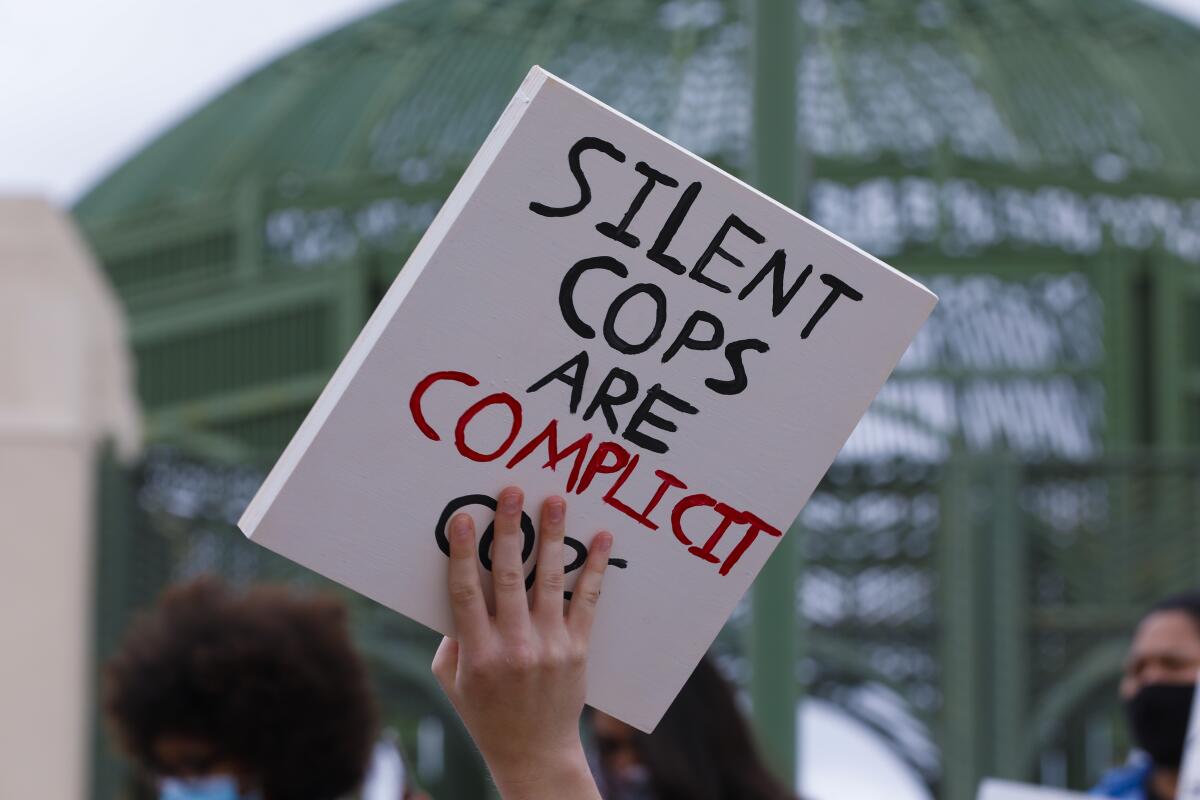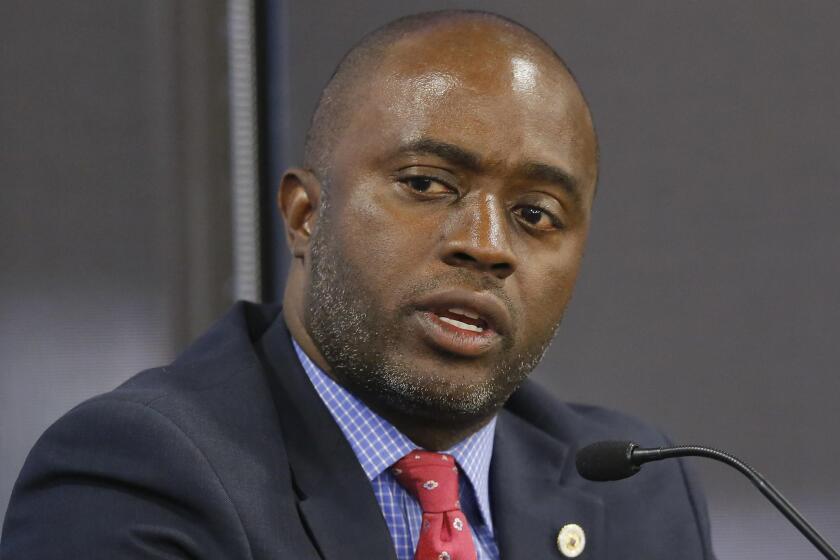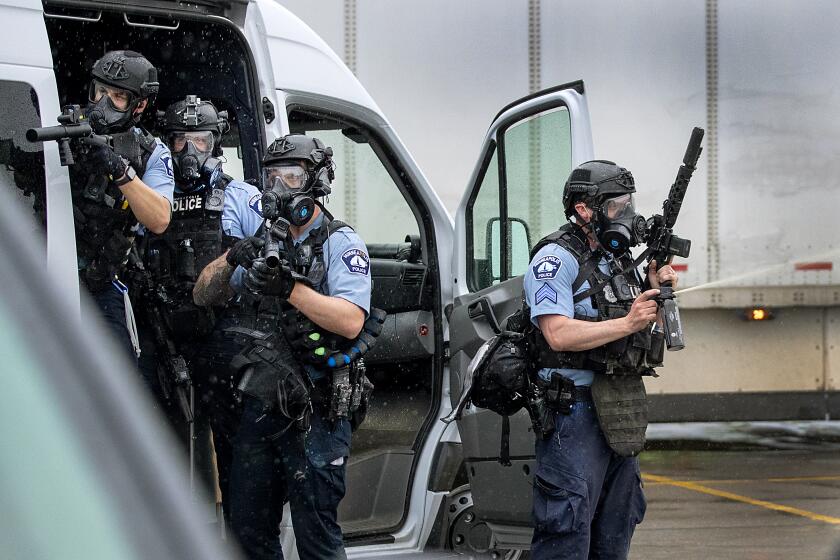Let civilians police the police. Politicians and law enforcement are protecting bad cops

- Share via
SACRAMENTO — The U.S. government had the right answer from the start: civilian control of the armed forces. State and local governments should have paid attention.
The commander in chief: a civilian. The ranking No. 2: a civilian secretary of Defense.
The American military isn’t perfect. But it’s basically disciplined and tends to keep the troops in line. Bad apples are routinely discarded.
Contrast that with local police and sheriffs’ departments — and, in much of their history, state prison guards. Bad apples stink up the entire place because they’re protected by the buddy system and hardly ever tossed.
City councils, boards of supervisors and state legislatures have been afraid to significantly control law enforcement because they fear risking their cozy political relationships with uniformed officers.
Now, finally, public pressure is mounting to force change because of repeated unjust white cop killings of Black men.
Los Angeles, San Francisco and Sacramento are among the cities moving toward dramatically changing their police forces’ missions. The goal is for cops to respond mostly only to criminal cases — trained specialists would handle noncriminal incidents.
On Monday, state Atty. Gen. Xavier Becerra announced a package designed to rein in officers who use excessive force. He urged that all agencies ban chokeholds, among other killer restraints, and make it easier to dump bad cops.
Last year, the Legislature passed a compromise bill requiring that deadly force be used only when “necessary” instead of the old standard: when “reasonable.”
Police unions in L.A., San Francisco and San Jose recently proposed a package of reforms that “emphasizes reverence for life, de-escalation, a duty to intercede [against abusive cops], proportional responses to dangerous incidents and strong accountability.”
Clearly, police unions are responding to the nationwide Black Lives Matter protests and the call to — as politically foolish as it is — “defund the police.”
It’s “either one of the dumbest ideas of all time or the hands-down winner of the worst slogan ever,” retired politician Willie Brown wrote in his Sunday column for the San Francisco Chronicle. Brown was the first Black person to be elected San Francisco mayor and the first Black state Assembly speaker.
On paper, state and local law enforcement are under civilian control. But it’s a façade because politicians — especially Democrats — rely on law enforcement unions to help them get reelected. Not enough politicians will stand up against the unions to crack down on their members’ misbehavior, let alone their retirement benefits.
California Superintendent of Public Instruction Tony Thurmond talked to George Skelton about his interactions with police.
Union endorsements are golden and their campaign money sweetens the pot.
You don’t see the Army, Navy and Air Force endorsing or donating to candidates for federal office. Nor U.S. Marshals and FBI agents.
What’s sorely needed in local law enforcement are independent, nonpolitical entities that investigate alleged abusive officers, recommend whether they should be fired and make their findings public.
Police and sheriff’s departments are incapable of honestly investigating themselves because it’s a blatant conflict of interest. And local politicians haven’t had the guts to force the issue.
“Democrats in particular are so afraid of being labeled ‘soft on crime’ that they’re terrified of standing up to police associations,” says Phil Trounstine, a former political and government reporter for the San Jose Mercury News who became Democratic Gov. Gray Davis’ chief spokesman.
“The only way to gain control of police behavior is to institute genuine civilian control with the power to discipline and terminate police officers for abusive behavior.”
In many U.S. cities, union contracts control disciplinary procedures, making it extremely hard to fire violent or abusive officers.
Trounstine and longtime Democratic consultant Garry South are promoting the need for powerful, independent civilian review boards to oversee local law enforcement.
“I’m exposing the Democrats’ dirty laundry,” says South, who was Davis’ chief strategist.
“There’s an unholy alliance between Democratic politicians and police officer associations,” South says. “Democrats need to show they’re tough on crime. And one of the ways they do that is scoring endorsements from police associations.
“I’ve sat in on dozens and dozens of endorsement conferences and they’re never about law enforcement issues that affect the public. They’re about working conditions, salaries, pensions, binding arbitration. There’s nothing wrong with that, but it puts Democratic politicians in bed with police unions.
“That’s the dirty little secret in the political world that everyone knows but nobody wants to talk about.”
In California, it’s illegal to use a law enforcement uniform and badge in a political ad.
“There’s a way around that,” South says. “I’ve done it.”
You craft a plastic badge with the union’s name on it and rent a uniform from a costume store. Voters “don’t know the difference,” South says. “I’ve rented cop cars from movie rental agencies with lights on top flashing around.
“It’s all basically a game. … The consequences are that when there are calls for really substantial reform, a lot of Democratic politicians are compromised because they’re dependent on unions giving them a fig leaf on public safety.”
Campaign money helps too.
MapLight, which monitors political donations, counted up $7 million in police union contributions to current California legislators over several elections. Roughly half the lawmakers received more than $50,000.
The biggest donors were the California Correctional Peace Officers Assn., the Peace Officers Research Assn. of California and the California Assn. of Highway Patrolmen.
“That’s only a fraction of what police unions spend on politics in California,” says MapLight President Dan Newman.
Unions have a constitutional right to support political candidates.
But the ability of politicians to repay unions can be substantially lessened by true civilian control of police.
More to Read
Sign up for Essential California
The most important California stories and recommendations in your inbox every morning.
You may occasionally receive promotional content from the Los Angeles Times.
















